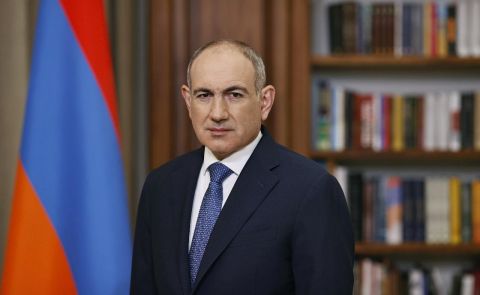
Pashinyan Affirms No Territorial Claims And Readiness To Dissolve Minsk Group, While Azerbaijan Cites Constitutional Barriers To Peace

On May 15, in Tirana, Armenian Prime Minister Nikol Pashinyan stated in response to an Azerbaijani journalist’s question that although Armenia has yet to draft a new Constitution, an analysis of the current one confirmed that, according to a decision by the Constitutional Court, Armenia holds no territorial claims against its neighbors.
During the exchange, Pashinyan emphasized that Azerbaijan raises two primary issues hindering the peace agreement’s conclusion: the dissolution of the OSCE Minsk Group and concerns over Armenia’s Constitution. He reiterated that Armenia accepts the proposal to dissolve the Minsk Group but insisted this should occur simultaneously with the signing of the peace treaty to prevent potential conflict exportation into Armenian territory. Pashinyan stressed that the already agreed-upon draft peace treaty between Armenia and Azerbaijan affirms mutual recognition of each other’s territorial integrity and sovereignty based on the Alma-Ata Declaration, converting former Soviet administrative borders into official state frontiers.
Pashinyan noted that the agreement contains provisions stipulating that neither side holds territorial claims against the other and commits not to raise such issues in the future. Furthermore, the draft states that no domestic legislation may impede the treaty’s implementation. He explained that following the treaty’s signing, Armenia’s Constitutional Court would assess its compliance with the Constitution, and upon ratification by Parliament, the agreement would attain supreme legal authority over national laws.
Addressing Azerbaijani concerns about alleged Armenian constitutional claims, Pashinyan argued that signing the peace agreement would officially confirm Armenia’s lack of territorial claims at the highest legal level. He added that Yerevan also sees territorial claims in Azerbaijan’s Constitution but refrains from raising the issue as vocally because the peace draft resolves it. Pashinyan reaffirmed Armenia’s readiness to dissolve the Minsk Group simultaneously with the treaty’s signing, dismissing Baku’s hesitance.
On May 16, Aykhan Hajizada, the Spokesperson for the Ministry of Foreign Affairs of Azerbaijan, responded to Pashinyan’s statements in a commentary shared by Report, accusing the Armenian leader of attempting to mislead the international community over constitutional claims and the Minsk Group’s dissolution.
Hajizada asserted that Armenia’s history of disregarding international agreements on territorial integrity, including its reservations when joining the Alma-Ata Declaration and refusal to recognize Karabakh as part of Azerbaijan, undermines Pashinyan’s arguments. He dismissed the Armenian Prime Minister’s claim about the supremacy of international treaties over domestic laws by citing Article 5 of the Armenian Constitution, which places the Constitution above all legal norms. He also pointed to Article 21, highlighting Armenia’s coat of arms as evidence of territorial claims.
Further, Hajizada criticized Armenia for supporting the separatist regime in Karabakh until Azerbaijan’s anti-terror operation in September 2023 and for its refusal over decades to accept the 1991 borders outlined in Soviet maps. He referenced the 2010 and 2024 Constitutional Court decisions, which upheld the Declaration of Independence’s principles as immutable, thereby preserving territorial claims against Azerbaijan and Turkey.
Concluding, Hajizada argued that Pashinyan’s insistence on sidelining these constitutional issues indicates Yerevan’s reluctance to achieve lasting peace, instead seeking to maintain territorial disputes for future use. He contended that Armenia’s opposition to dissolving the Minsk Group without linking it to a peace deal reveals a hidden agenda. Declaring that Armenia’s Constitution poses a direct security threat to Azerbaijan, Hajizada stated that demanding its amendment is a legitimate and necessary condition for sustainable peace.
See Also


Albanian Deputy Minister Notes SOCAR Partnership Seen As Key To Accelerating Albania’s Gas Infrastructure

Kobakhidze Attends European Political Community Summit In Tirana

Russia Slams Armenian Military Official Over WWII Comments

Pashinyan Engages with Albanian and EU Leaders at EPC Summit

